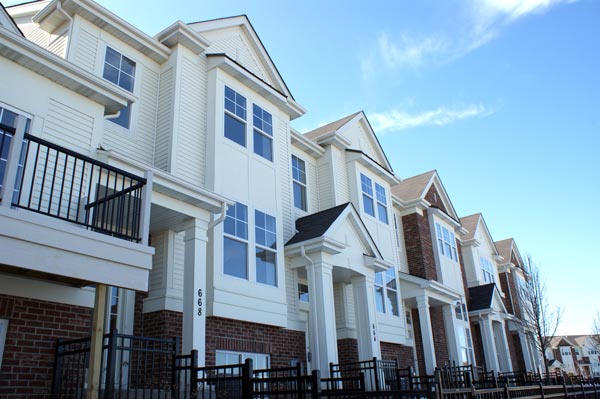
The Plaza on New York in Aurora is among the properties M/I Homes has purchased after developers went bankrupt.
By sifting through builders’ projects that went bust in the Chicago suburbs, Ohio-based M/I Homes is hoping to make its name here as a company that successfully picked up where others left off—and handed off the savings to homebuyers.
“There were a significant number of [projects] out there that, when the storm came in, they were not able to weather it,” says Ron Martin, the president of M/I’s Chicago branch. “We’re focusing on picking up the ones that we can make work.”
Martin’s outfit has so far bought three stalled townhouse developments: Shelburne Crossing in Winfield, which had been a Kimball Homes project before that company went bankrupt; the Plaza on New York in Aurora, which M/I bought from a bank that had taken the development back from the builder Wiseman-Hughes; and Church Street Station in Hanover Park, which was a Neumann Homes project before that company declared bankruptcy. Martin—who, before joining M/I, had worked locally for Neumann Homes and the homebuilder Lennar—says that he is close to announcing two more deals, in Carol Stream and St. Charles.
The projects were in varying stages of completion when M/I took over, but in each case, the development had roads and other infrastructure mostly in place, as well as finished model homes and some sold and occupied homes. M/I tweaks the floor plans and exterior finishes before building more homes. The key change is in price: At Church Street Station, M/I will offer the homes at roughly $80,000 below the original builder’s prices, which ranged from about $260,000 to around $300,000. At the Plaza on New York, M/I has lowered prices by about $60,000.
Buying improved land at distress-sale prices is one factor in the new, lower prices. Another is that both labor and materials cost less now. Martin estimates that labor costs have come down by about 15 percent from the height of the market, and materials by about 5 percent. And because he is buying already improved land, Martin gets to skip the time-consuming process of getting the various approvals needed before building. “These are ready to go, and the [municipalities] don’t want to see them sit there growing weeds,” Martin says.
Nor, he suggests, do residents who already bought into the developments, despite having paid more for their homes than any newcomers. “The alternative [for them] is to live in a development with unfinished roads and with only half the streetlights on and the community not being maintained,” Martin says. “We’re going to come in and finish your community the way you thought it was going to be when you bought. We didn’t cause the market to go down; we’re just reacting to where it is now.”
So far, sales have been healthy. At Shelburne Crossing, where prices have come down by about $80,000, 40 homes were sold in 2009, and Martin projects that 50 more will be sold this year. And this winter at the Plaza, four homes were sold in the first three weeks of sales.


